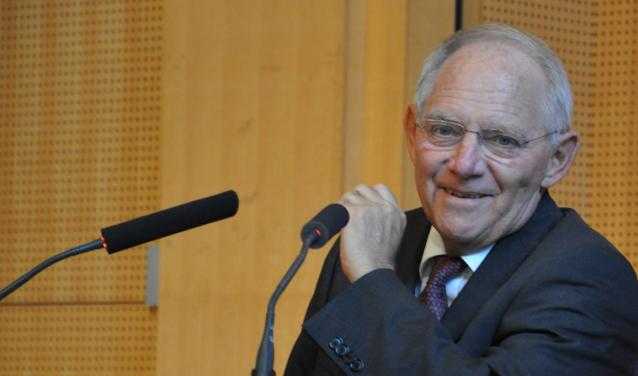Home>“Europe is not the problem, it is the solution”

08.10.2015
“Europe is not the problem, it is the solution”
Wolfgang Schäuble, the German finance minister, was at Sciences Po on 6 October 2015 to debate the future of Europe, as Germany and all of Europe celebrate the 25th anniversary of German reunification.
Schäuble, introduced as “a man of principle” by Sciences Po President Frédéric Mion, played a decisive role in uniting Germany as the then-Minister of the Interior (1989-1991). He has now emerged as one of the most influential leaders of the Eurogroup.
Speaking of the economic challenges Europe is facing, Schäuble stressed the fact that Europe had managed to preserve the Eurozone’s unity and to handle the financial crisis. The current difficulties in returning to a high, sustainable level of economic growth may be due to limited structural investment in Europe and to the lack of a common fiscal policy. Indeed, according to Schäuble, the effectiveness of the monetary union depends on such a policy.
With regard to the Greek situation, he said the social consequences of the crisis were a “tragedy”, but also pointed out that part of the responsibility lay with Greece itself, referring notably to corruption. He added that the IMF had lobbied Europe for firmness towards Greece; “Ask Mrs Lagarde!” he said. Schäuble rejects the idea of a “Grexit” and claims to be optimistic about the outcome of negotiations with Great Britain about its membership in the EU.
Turning to the issue of refugees, Schäuble spoke in strong opposition to the reinstatement of internal European borders but argued that Europe had to control its external borders. The highly attractive European social system makes this European regulation necessary, he said, not least because “the most talented people from Africa come to Europe” and leave their continent with a weaker potential for development.
When asked a question about euroscepticism, he declared that fighting it was a daily mission for us all. "We must convince any Eurosceptics around us that Europe is the solution because it is the only way to remain a force in a globalised world", he said.
Article by Mathilde Viart, a first year student in the European Franco-German undergraduate programme on the Sciences Po campus in Nancy.
The Sciences Po campus in Nancy offers a multidisciplinary core curriculum in the social sciences (history, economics, law, political science and sociology). Its 350 students come from French- and German-speaking countries and represent 28 nationalities. Courses are taught in three languages (French, German and English) and students can also learn Arabic, Spanish, Swedish or Russian. The Sciences Po campus in Nancy also offers dual Bachelor’s degrees with Freie Universität Berlin and University College London.